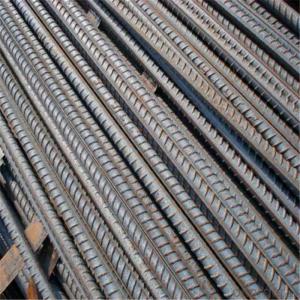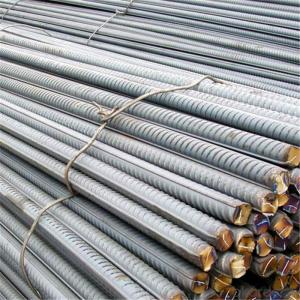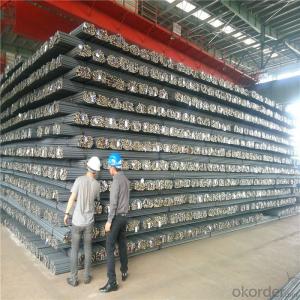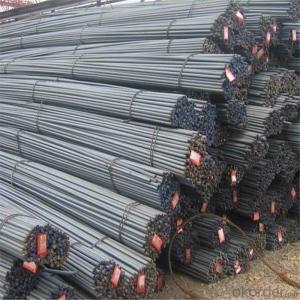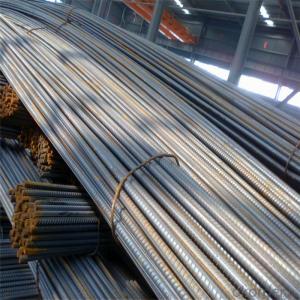Cold Rolled Ribbed Bars 6mm 8mm 10mm 12mm
- Loading Port:
- Tianjin
- Payment Terms:
- TT or LC
- Min Order Qty:
- 100 m.t.
- Supply Capability:
- 500000 m.t./month
OKorder Service Pledge
OKorder Financial Service
You Might Also Like
Item specifice
Cold Rolled Ribbed Bars 6mm
Description of Cold Rolled Ribbed Bars 6mm
1, Diameter: 5.5mm-10mm Cold Rolled Ribbed Bars 6mm
10m- 40mm Cold Rolled Ribbed Bars 6mm
2, Length: 6m, 9m, 12m or customized
3, Standard: GB, ASTM, AISI, SAE, DIN, JIS, EN
OEM technology - send detailed technical parameters for accurate quotation.
2, Produce Process: smelt iron - EAF smelt billet - ESR smelt billet -
hot rolled or forged to get the steel round bar and plate
3, Heat Treatment: annealing, normalizing, tempering, quenching
4, Surface Treatment: Black
5, Quality Assurance: We accept third party inspection for all orders.
You can ask testing organizations such as SGS, BV, etc. to test our products before shipping.
Chemical Composition of Cold Rolled Ribbed Bars 6mm
Grade | Technical data of the original chemical composition(%) | |||||
Reinforcing steel bar HRB335 | C | Mn | Si | S | P | B |
≤0.25 | ≤1.60 | ≤0.80 | ≤0.045 | ≤0.045 | >0.0008 | |
Physics Capability | ||||||
Yield Strength(N/cm2) | Tensile Strength(N/cm2) | Elongation(%) | ||||
≥ 335 | ≥490 | ≥16 | ||||
Reinforcing steel bar HRB400 | C | Mn | Si | S | P | B |
≤0.25 | ≤0.16 | ≤0.80 | ≤0.045 | ≤0.045 | 0.04-0.12 | |
Physics Capability | ||||||
Yield Strength(N/cm2) | Tensile Strength(N/cm2) | Elongation(%) | ||||
≥ 400 | ≥ 570 | ≥ 14 | ||||
Products Show of Cold Rolled Ribbed Bars 6mm
Company Information
CNBM International Corporation is the most important trading platform of CNBM group.
Whith its advantages, CNBM International are mainly concentrate on Cement, Glass, Iron and Steel, Ceramics industries and devotes herself for supplying high qulity series of refractories as well as technical consultancies and logistics solutions.


F A Q
1, Your advantages?
professional products inquiry, products knowledge train (for agents), smooth goods delivery, excellent customer solution proposale
2, Test & Certificate?
SGS test is available, customer inspection before shipping is welcome, third party inspection is no problem
3, Factory or Trading Company?
CNBM is a trading company but we have so many protocol factories and CNBM works as a trading department of these factories. Also CNBM is the holding company of many factories.
4, Payment Terms?
30% TT as deposit and 70% before delivery.
Irrevocable L/C at sight.
5, Trading Terms?
EXW, FOB, CIF, FFR, CNF
6, After-sale Service?
CNBM provides the services and support you need for every step of our cooperation. We're the business partner you can trust.
For any problem, please kindly contact us at any your convenient time.
We'll reply you in our first priority within 24 hours.
- Q:What are the different material selection factors for special steel?
- To ensure the desired performance, durability, and cost-effectiveness of the final product, engineers and designers must consider various factors when selecting materials for special steel. Key factors include mechanical properties, corrosion resistance, heat resistance, machinability, weldability, cost, availability, and environmental impact. 1. Mechanical Properties: Special steel must possess the necessary mechanical properties to meet the demands of the specific application. This includes strength, hardness, toughness, fatigue resistance, and wear resistance. 2. Corrosion Resistance: Depending on the intended use, special steel may need to have high corrosion resistance to withstand harsh environments, chemicals, or moisture. This ensures the longevity and reliability of the steel in its intended application. 3. Heat Resistance: Special steel may need to exhibit excellent heat resistance, especially for applications involving high temperatures like aerospace or power generation industries. The material should retain its strength and structural integrity even at elevated temperatures. 4. Machinability: The ease of machining special steel is crucial, especially for applications involving complex shapes or precision components. High machinability allows for efficient manufacturing processes and reduces production costs. 5. Weldability: Special steel selected for applications requiring welding should have good weldability. This ensures that the material can be easily welded without compromising strength or introducing defects. 6. Cost: The cost of the material plays a significant role in material selection. Engineers and designers must balance desired properties with the available budget to achieve optimal cost-effectiveness. 7. Availability: Ensuring a reliable and consistent supply of the chosen special steel is vital to avoid production delays or interruptions. 8. Environmental Impact: The environmental impact of the material should be evaluated, considering factors such as energy consumption during production, recyclability, and the use of sustainable raw materials. Opting for eco-friendly materials aligns with sustainable practices and regulations. By carefully considering these material selection factors, engineers and designers can choose the most suitable special steel for their specific application, ensuring optimal performance, durability, and cost-efficiency.
- Q:How does special steel perform in heat treatment applications?
- Special steel is specifically designed to perform well in heat treatment applications. Unlike regular steel, special steel has been alloyed with specific elements to enhance its heat resistance and improve its mechanical properties. When subjected to heat treatment processes such as annealing, quenching, tempering, or hardening, special steel undergoes structural changes that result in improved strength, hardness, toughness, and wear resistance. The performance of special steel in heat treatment applications can be attributed to its unique alloying elements, such as chromium, molybdenum, nickel, and vanadium. These elements form various carbides, nitrides, or intermetallic compounds during heat treatment, which contribute to the overall improvement in the steel's properties. For example, chromium forms chromium carbides that increase hardness and corrosion resistance, while molybdenum and vanadium promote hardenability and wear resistance. Moreover, special steel exhibits excellent dimensional stability during heat treatment. It has a low tendency to warp or distort, ensuring that the final product maintains its desired shape and dimensions. This dimensional stability is particularly crucial for applications that require tight tolerances or intricate designs. Additionally, special steel offers consistent and reliable heat treatment results. Its composition and microstructure are carefully controlled, ensuring that it responds predictably to heat treatment processes. This allows manufacturers to achieve the desired mechanical properties consistently, reducing the risk of inconsistencies or failures in the final product. In summary, special steel performs exceptionally well in heat treatment applications. Its unique alloying elements, dimensional stability, and consistent heat treatment response make it an ideal choice for applications that require improved strength, hardness, toughness, and wear resistance. Whether it is for automotive components, tooling, or industrial machinery, special steel delivers reliable and enhanced performance after undergoing heat treatment processes.
- Q:What are the applications of special steel in the food processing industry?
- Special steel is widely used in the food processing industry due to its unique properties. It is utilized for manufacturing various equipment and components that require high strength, corrosion resistance, and hygiene standards. Some applications include the production of food processing machinery, cutting tools, knives, blades, and containers. Special steel ensures durability, cleanliness, and safety, making it an indispensable material in the food processing industry.
- Q:How is special steel used in the production of aircraft landing gear?
- Special steel is used in the production of aircraft landing gear due to its high strength, durability, and resistance to fatigue. It helps ensure the landing gear can withstand the stress and impact forces experienced during takeoff, landing, and taxiing. Additionally, special steel alloys are used to create components with precise dimensions and superior corrosion resistance, ensuring the landing gear performs reliably in various environmental conditions.
- Q:What are the heat treatment processes used for special steel?
- Some of the heat treatment processes used for special steel include annealing, quenching, tempering, and hardening. Annealing involves heating the steel to a specific temperature and slowly cooling it to improve its ductility and reduce internal stress. Quenching is a rapid cooling process that hardens the steel by quickly cooling it from a high temperature, creating a tough and wear-resistant material. Tempering is a process that follows quenching, where the steel is reheated to a lower temperature to reduce brittleness and improve toughness. Hardening involves heating the steel to a high temperature and then rapidly cooling it to increase its hardness and strength. These heat treatment processes are used to enhance the properties and performance of special steel for various applications.
- Q:How does special steel contribute to the automotive racing machinery industry?
- Special steel plays a crucial role in the automotive racing machinery industry by providing high-performance materials that enhance the performance, durability, and safety of racing vehicles. One of the primary contributions of special steel to the industry is its ability to improve the power and speed of racing cars. Special steel alloys, such as carbon fiber-reinforced steel or high-strength steel, offer superior strength-to-weight ratios, allowing manufacturers to reduce the weight of the vehicle while maintaining structural integrity. This reduction in weight enhances the acceleration and maneuverability of the racing car, resulting in increased speed and improved lap times on the track. In addition to improved performance, special steel also contributes to the safety of racing vehicles. The high strength and impact resistance properties of certain steel alloys make them ideal for constructing roll cages, chassis, and other critical safety components. These materials can withstand extreme forces during crashes or collisions, providing enhanced protection for the driver and minimizing the risk of severe injuries. Special steel also contributes to the longevity and durability of automotive racing machinery. The harsh conditions of racing, such as high temperatures, vibrations, and mechanical stress, can cause regular steel to deform or deteriorate quickly. However, special steel alloys are specifically engineered to withstand these demanding environments, ensuring that racing cars can endure the rigorous demands of the sport without compromising performance or safety. Furthermore, special steel alloys offer excellent thermal conductivity and heat resistance properties, which are essential for racing vehicles that generate immense heat during high-speed runs. By efficiently dissipating heat, special steel helps prevent overheating and ensures optimal engine performance, reducing the risk of mechanical failures and maximizing the lifespan of the racing machinery. In summary, special steel contributes significantly to the automotive racing machinery industry by enhancing the performance, durability, and safety of racing vehicles. The use of high-performance steel alloys helps increase speed, improve lap times, and reduce the weight of the vehicles. It also provides superior strength and impact resistance, enhancing safety during crashes or collisions. Moreover, special steel alloys offer excellent heat resistance and thermal conductivity, ensuring optimal engine performance and prolonging the lifespan of the racing machinery.
- Q:How is special steel used in the marine supply chain?
- Special steel is used extensively in the marine supply chain due to its exceptional strength, corrosion resistance, and durability. It is utilized in the construction of various marine components such as ship hulls, propeller shafts, offshore platforms, and marine equipment. Special steel ensures the structural integrity and longevity of these critical marine structures, enabling safe and efficient operations in harsh and corrosive marine environments.
- Q:What are the environmental impacts of producing special steel?
- The production of special steel has several environmental impacts. Firstly, the extraction of raw materials such as iron ore and coal leads to habitat destruction and loss of biodiversity. Secondly, the manufacturing process involves high energy consumption, contributing to greenhouse gas emissions and climate change. Additionally, the use of various chemicals and additives in steel production can result in water and soil pollution. Lastly, the disposal of waste materials, including slag and dust, can have detrimental effects on local ecosystems if not properly managed.
- Q:How is nitrogen alloyed steel used in the production of high-strength bolts?
- Nitrogen alloyed steel is used in the production of high-strength bolts to enhance their mechanical properties. By adding nitrogen as an alloying element, the steel becomes stronger, more resistant to corrosion, and exhibits improved toughness. This makes the bolts suitable for applications requiring high levels of strength and durability, such as in construction, automotive, and aerospace industries.
- Q:How long does special steel last compared to regular steel?
- Due to its unique composition and properties, special steel tends to have a longer lifespan than regular steel. Regular steel primarily consists of iron and carbon, while special steel is alloyed with elements like chromium, nickel, and molybdenum to enhance its strength, hardness, and resistance to corrosion. The lifespan of special steel is influenced by factors such as the specific type of steel, its usage conditions, and maintenance practices. However, in general, special steel has a significantly longer lifespan compared to regular steel. It exhibits greater resistance to wear and tear, corrosion, and high temperatures, making it suitable for demanding applications and environments. Industries such as aerospace, automotive, and construction extensively utilize special steel for critical components like engine parts, structural elements, and cutting tools. These components often endure high stress, friction, and exposure to harsh conditions. Special steel's exceptional properties enable it to withstand these challenges and maintain its performance for an extended period. Furthermore, special steel undergoes rigorous testing and quality control measures during its manufacturing process. This ensures that it meets specific industry standards and can endure extreme conditions without significant degradation. In contrast, regular steel may not possess the same level of durability or longevity. In conclusion, special steel generally lasts longer than regular steel due to its enhanced properties and resistance to wear, corrosion, and high temperatures. Although the exact lifespan may vary depending on various factors, special steel's superior characteristics contribute to its prolonged durability.
1. Manufacturer Overview |
|
|---|---|
| Location | |
| Year Established | |
| Annual Output Value | |
| Main Markets | |
| Company Certifications | |
2. Manufacturer Certificates |
|
|---|---|
| a) Certification Name | |
| Range | |
| Reference | |
| Validity Period | |
3. Manufacturer Capability |
|
|---|---|
| a)Trade Capacity | |
| Nearest Port | |
| Export Percentage | |
| No.of Employees in Trade Department | |
| Language Spoken: | |
| b)Factory Information | |
| Factory Size: | |
| No. of Production Lines | |
| Contract Manufacturing | |
| Product Price Range | |
Send your message to us
Cold Rolled Ribbed Bars 6mm 8mm 10mm 12mm
- Loading Port:
- Tianjin
- Payment Terms:
- TT or LC
- Min Order Qty:
- 100 m.t.
- Supply Capability:
- 500000 m.t./month
OKorder Service Pledge
OKorder Financial Service
Similar products
New products
Hot products
Hot Searches
Related keywords
